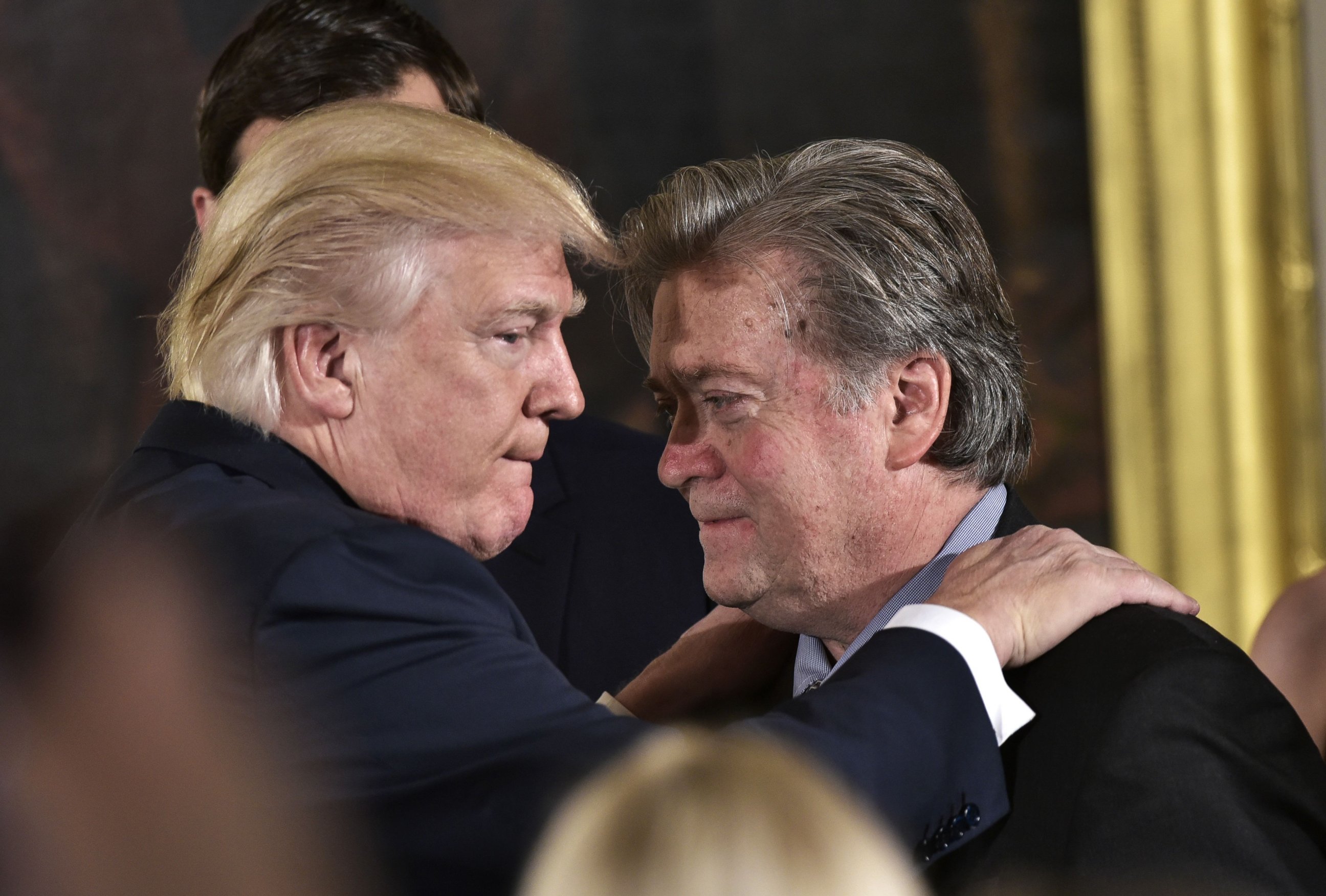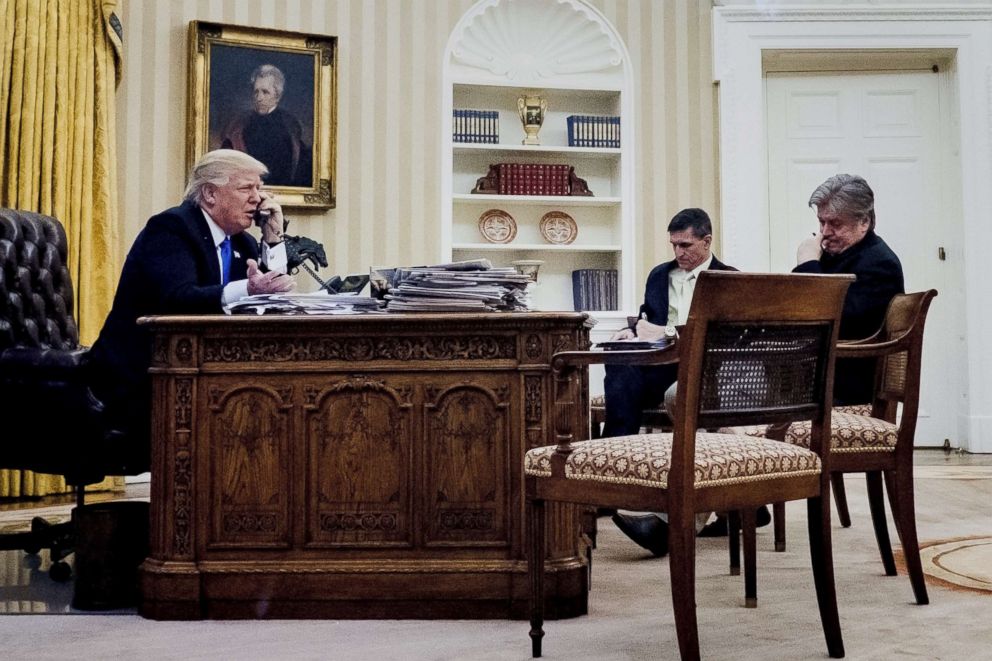Trump says Bannon 'lost his mind' after he was fired
Trump says Bannon "lost his mind" after calling June 2016 meeting "treasonous."
— -- President Donald Trump hit back at Steve Bannon in scathing comments on Wednesday saying that when his former White House chief strategist was fired "he not only lost his job, he lost his mind".
President Trump's comments, which came in the form of a written statement from the White House, were in response to Bannon's strident criticism of Donald Trump Jr., Jared Kushner and Paul Manafort for sitting down with a group of Russians who promised damaging information against Hillary Clinton during the 2016 election in excerpts from a new book by Michael Wolff, "Fire and Fury: Inside the Trump White House".
“Steve Bannon has nothing to do with me or my Presidency. When he was fired, he not only lost his job, he lost his mind. Steve was a staffer who worked for me after I had already won the nomination by defeating seventeen candidates, often described as the most talented field ever assembled in the Republican party,” the president said in a statement. “Now that he is on his own, Steve is learning that winning isn’t as easy as I make it look. Steve had very little to do with our historic victory, which was delivered by the forgotten men and women of this country. Yet Steve had everything to do with the loss of a Senate seat in Alabama held for more than thirty years by Republicans. Steve doesn’t represent my base — he’s only in it for himself.”

The statement went on to read Bannon “pretends to be at war with the media” and “yet he spent his time at the White House leaking false information to the media to make himself seem far more important than he was.”
For his part, Bannon is quoted as worrying about the legal implications of the June 2016 meeting according to Wolff's book.
“Even if you thought that this was not treasonous, or unpatriotic, or bad [expletive], and I happen to think it’s all of that you should have called the FBI immediately,” Bannon is quoted as saying of the legal implications of the June 2016 meeting according to Wolff's book.
Later in the day on Wednesday, Bannon told a listener who called into Breitbart News' SiriusXM show, "The president of the United States is a great man. You know I support him, day in and day out, whether going through the country giving the Trump miracle speech or on the show or on the website."
In the book, Bannon suggests such information should have been passed on to lawyers as intermediaries and pushed for publication "down to Breitbart or something like that, or maybe some other more legitimate publication."
Bannon returned to Breitbart as executive chairman in August.
Bannon did not immediately respond to ABC News when asked for comment on whether he disputes the quotes attributed to him in the article.
Spokespeople for Kushner and Trump Jr. did not immediately respond to request for comment.
Bannon is also quoted in the book as offering a candid and damning outlook on the prospects of Special Counsel Robert Mueller's investigation into potential Trump campaign collusion with Russian efforts to meddle in the 2016 election and raising alarm over investigators directing their inquiry into the finances of those in Trump's inner circle.

“You realize where this is going,” Bannon is quoted as saying. “This is all about money laundering. Mueller chose [senior prosecutor Andrew] Weissmann first and he is a money-laundering guy. Their path to [expletive] Trump goes right through Paul Manafort, Don Jr and Jared Kushner … It’s as plain as a hair on your face.”
Manafort, Trump’s former campaign chairman, pleaded not guilty after he and his associate Rick Gates were indicted in October on charges including conspiracy against the United States, money laundering and working as unregistered foreign agents.
It's not the first time Bannon, who continues to advise the president from outside the White House, has drawn attention for his candid comments after leaving his post.
In a September interview with '60 Minutes,' Bannon described Trump's firing of former FBI Director James Comey as the "biggest mistake in modern political history."
During the White House press briefing, White House Press Secretary Sarah Sanders said Trump was “furious” and “disgusted” to learn of the comments Bannon made to Wolff.
Sanders said that Wolff “never actually sat down with the president” and when they did it “was one brief conversation” for “five to seven minutes in total” and that’s it since he’s taken office. As for his access to the White House staff, Sanders said “I think close to 95 percent” of the “just over a dozen” interactions were done so at Steve Bannon’s request.
Several prominent news outlets have raised concerns about the reliability of Wolff’s reporting.
“For whatever reason, Wolff seems to have arrived at a stunning amount of incredible conclusions that hundreds of dogged reporters from major newspapers haven’t,” wrote Aaron Blake, a political reporter with the Washington Post. “Whether that's because he had unprecedented access … or because his filter was just more relaxed than others, it's worth evaluating each claim individually and not just taking every salacious thing said about the White House as gospel.”
In response to those concerns, a spokesperson for Henry Holt and Company, the book’s publisher, told ABC News that Wolff stands by the reporting.
The spokesperson did not answer specific questions about how the claims in the book were fact-checked.
New York Magazine, which published an excerpt from the book on Wednesday, provided some additional details about the reporting process in an editor’s note.
“Wolff, who chronicles the administration from Election Day to this past October, conducted conversations and interviews over a period of 18 months with the president, most members of his senior staff, and many people to whom they in turn spoke,” the note reads. “Shortly after Trump’s inauguration, Wolff says, he was able to take up ‘something like a semi-permanent seat on a couch in the West Wing.’”
The magazine also addressed the unique set of “journalistic challenges” in reporting on the Trump White House, including seemingly blurred lines between on- and off-the-record conversations.
“In true Trumpian fashion, the administration’s lack of experience and disdain for political norms made for a hodgepodge of journalistic challenges,” the note continues. “Information would be provided off-the-record or on deep background, then casually put on the record. Sources would fail to set any parameters on the use of a conversation, or would provide accounts in confidence, only to subsequently share their views widely. And the president’s own views, private as well as public, were constantly shared by others.”




